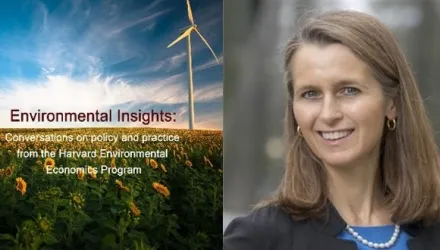Note on COP-26
This paper will serve as the basis for two panel events conducted by the Harvard Project on Climate Agreements in connection with COP-26 in Glasgow, Scotland. Details:
- Prospects for Article 6: COP-26 and Beyond
Webinar
Monday, November 1, 2021; 9:00 – 10:15 U.S. Eastern Daylight Time
More details, including registration link, here.
- Securing Climate Ambition with Cooperative Approaches: Options under Article 6
In-person at COP-26
Hosted by the Harvard Project on Climate Agreements, the Enel Foundation, and Foundation Environment - Law Society (FURG)
Wednesday, November 10, 2021; 4:45 – 6:00 pm Greenwich Mean Time
Location: Clyde Auditorium (within the “Blue Zone” at COP-26)
More details here.
Abstract and Background
Article 6 of the Paris Agreement enables Parties to engage in voluntary cooperation as they implement their nationally determined contributions (NDCs). Specifically, Article 6 sets out three pathways for voluntary cooperation:
- cooperative approaches through the use of internationally transferred mitigation outcomes (ITMOs) in Article 6.2;
- a new crediting mechanism, sometimes referred to as the “Sustainable Development Mechanism”, in Article 6.4; and
- a framework for non-market approaches in Article 6.8.1
Although Article 6 omits explicit reference to carbon markets, it “firmly anchors market mechanisms in the Paris Agreement” with the two options set out in Article 6.2 and 6.4, and thereby leverages the promise of such mechanisms to lower the cost of achieving agreed climate policy outcomes. A recent study suggests that the compliance flexibility introduced by Article 6 can reduce the overall costs of mitigation under currently submitted NDCs by approximately US$ 300 billion per year in 2030, echoing earlier estimates of savings of similar magnitude. Such cost reductions, in turn, can increase the latitude of countries to scale up global climate ambition by unlocking additional resources that can be diverted to mitigation activities. Calculations of the additional mitigation achievable by reinvesting avoided cost are, again, staggering, and would roughly allow doubling already pledged emission reductions annually through 2030.
Given the substantial shortfall between currently pledged NDCs and the ambition required to achieve the temperature stabilization targets of the Paris Agreement, international cooperation under Article 6 has been described as a necessary “tool to promote more mitigation action … and pave the way for progress within the next NDC cycle.” Critics have countered that Article 6 could weaken ambition under the Paris Agreement if it lacks sufficient integrity or creates a distorted incentive for future NDCs. With a recent synthesis report of NDCs confirming that a majority of Parties intends to use Article 6 as a source of climate finance or as a means to achieve pledged emission reductions, the stakes for Article 6 are high.
Importantly, however, the treaty provision that constitutes Article 6 in the Paris Agreement is sparsely worded and replete with vague concepts. Such “constructive ambiguity” — often a deliberate choice to accommodate conflicting viewpoints — can compromise implementation of Article 6 by leaving room for divergent interpretations of key operational elements and creating uncertainty. Parties have therefore been engaged in developing rules and guidance for implementation of Article 6 since adoption of the Paris Agreement. Just as Article 6 was the last provision Parties agreed upon when the Paris Agreement was adopted, its operationalization continues to defy a negotiated outcome.
This discussion paper explores key areas of disagreement on Article 6 and explores possible outcomes from the upcoming Conference of the Parties to the United Nations Framework Convention on Climate Change (COP-26) in November 2021 in Glasgow.
Acknowledgement
The Harvard Project on Climate Agreements is grateful to the Enel Foundation and the Enel Endowment for Environmental Economics at Harvard University for generous support of a series of annual discussion papers on climate-change policy and related topics in energy policy, of which this paper is the tenth.
Author Affiliations
Michael A. Mehling
Deputy Director, Center for Energy and Environmental Policy Research, Massachusetts Institute of Technology, Cambridge, Massachusetts, USA
Professor, School of Law, University of Strathclyde, Glasgow, UK.
Mehling, Michael A. “Advancing International Cooperation under the Paris Agreement: Issues and Options for Article 6.” October 2021




